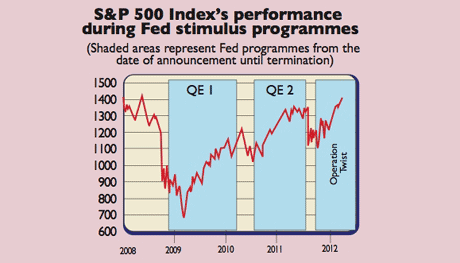Get the latest financial news, insights and expert analysis from our award-winning MoneyWeek team, to help you understand what really matters when it comes to your finances.
You are now subscribed
Your newsletter sign-up was successful
Want to add more newsletters?

Twice daily
MoneyWeek
Get the latest financial news, insights and expert analysis from our award-winning MoneyWeek team, to help you understand what really matters when it comes to your finances.

Four times a week
Look After My Bills
Sign up to our free money-saving newsletter, filled with the latest news and expert advice to help you find the best tips and deals for managing your bills. Start saving today!
"For all the signs of [US] recovery, it turns out what investors really care about is QE3," says James Mackintosh in the Financial Times. Last week, the minutes of the US Federal Reserve's latest meeting were released. They showed another dose of quantitative easing, or money-printing, has become less likely.
Stocks promptly tanked, with European and US markets falling by 2% and 1% respectively. The European Central Bank (ECB) also appeared to rule out another major liquidity injection. Over the past few months, it has lent banks around €1trn of extremely cheap money.
Investors and traders "were collectively throwing their toys out of the cot at the prospect of the major central banks no longer supplying them with continuous, endless and free liquidity", says Fxpro.com. As with an alcoholic denied booze, "threatening to withdraw liquidity from heavily-addicted asset markets can have very nasty consequences".
MoneyWeek
Subscribe to MoneyWeek today and get your first six magazine issues absolutely FREE

Sign up to Money Morning
Don't miss the latest investment and personal finances news, market analysis, plus money-saving tips with our free twice-daily newsletter
Don't miss the latest investment and personal finances news, market analysis, plus money-saving tips with our free twice-daily newsletter
The chart shows how strongly the performance of the US market, which tends to set the tone for world equities, has been linked to the Fed's cash injections in recent years.

Operation Twist is a stimulus programme whereby the Fed sells some of the short-term bonds it's amassed with printed money, and uses the proceeds to buy longer-term bonds. It thus tries to stimulate the economy by lowering long-term interest rates. Twist coincided with the ECB's cheap three-year loans.
For some time now, markets have appeared to want it both ways. On the one hand, they have been cheered by better data, but also by signs of more liquidity. Yet if the latter is needed, then the economy is clearly in poor shape hardly a reason for market optimism.
MoneyWeek videos

What is Operation Twist?
Tim Bennett explains the Federal Reserve's latest attempt to stimulate the flagging US economy.
Watch all of Tim's videos here
Moreover, it's become clear that injecting printed money into the economy hasn't magically caused a vigorous recovery. QE "can create confidence and buy time, but it will not solve the underlying difficulties caused by the long-lasting debt deleveraging process", says Andrew Milligan of Standard Life Investments.
So why this desperation for more QE? What investors wanted was a "kind of postmodern Goldilocks economy", as Mackintosh puts it. "Not too hot to discourage QE3, but not so cold as to bring on a new recession." However, what they're getting is "lukewarm porridge: no QE3, but slow growth".
Get the latest financial news, insights and expert analysis from our award-winning MoneyWeek team, to help you understand what really matters when it comes to your finances.
MoneyWeek is written by a team of experienced and award-winning journalists, plus expert columnists. As well as daily digital news and features, MoneyWeek also publishes a weekly magazine, covering investing and personal finance. From share tips, pensions, gold to practical investment tips - we provide a round-up to help you make money and keep it.
-
 Should you buy an active ETF?
Should you buy an active ETF?ETFs are often mischaracterised as passive products, but they can be a convenient way to add active management to your portfolio
-
 Power up your pension before 5 April – easy ways to save before the tax year end
Power up your pension before 5 April – easy ways to save before the tax year endWith the end of the tax year looming, pension savers currently have a window to review and maximise what’s going into their retirement funds – we look at how

